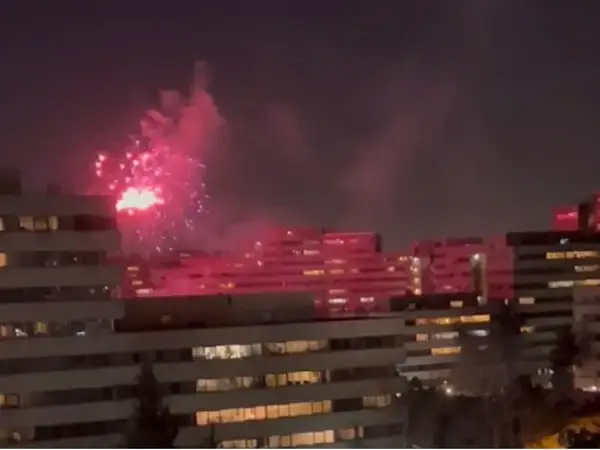Many Iranians marked the 45th anniversary of the 1979 Revolution Saturday night with cries of "Death to the Dictator" ringing through neighborhoods in the capital Tehran.
Video clips recorded on mobile phones show people chanting against the regime during official fireworks to commemorate 22 Bahman (11 February), the day the Pahlavi dynasty collapsed and gave way to what is now known as the Islamic Republic.
“The government celebrates, we mourn,” says Ramtin, a freshman at Tehran University who lives in east Tehran. “They know everybody hates the system. They know people are angry. And still they rub their celebration in our face –on TV, on billboards across the city, and now these fireworks. I’m not sure I would’ve chanted tonight if there were no fireworks.”
The gulf between the state and the majority of Iranians has never been wider. The society at large, and the younger generation, in particular, have ‘moved on’ from the Islamic Republic.
“The anniversary is as relevant to us as the Chinese new year, perhaps less,” says Saba, a 34-year old musician who’s turned to catering to earn a living. “No one cares, really. But when the thugs come to your neighborhood crying Allah-o Akbar, you fume and you cry your lungs out to shut them up.”
This seems to have been the pattern of protests Saturday night. There was no ‘call to action’, no online campaign even, to spur people to protest on the anniversary of the revolution. In most places, so far as it can be gathered from posts on social media, the protests have been spontaneous reactions to the regime’s propaganda.
“It is depressing, in a way,” Saba explains, “to stand by the window in your room and cry Death to the Islamic Republic. It does nothing to the Islamic Republic. We just show them we hate them. But even that they know already. Or you can say we remind ourselves that we’re still there. And we’re the many. Yeah, that’s the most important thing, I think.”
Ironically, the ‘home-chanting’ is a legacy of the 1979 Revolution. During martial law and at times of curfew, those who didn’t want to risk going out would chant against the Shah (Mohammad Reza Pahlavi) from their rooftops.
“They were mad,” Ramtin says jokingly. “My uncle was roughly my age in 1979. He was very active at university. After the revolution, he wasn’t allowed back in the university. He fled before I was born, during the war [with Iraq], first to Germany and then to the US. He’s living his best life now and people like me have to suffer the consequences of his madness after 45 years.”
The younger generation of Iranians see the Islamic Republic and its ideology as an obstacle to the life they want to live. Their opposition to the regime is more personal than political.
“When I cry Death to the Islamic Republic, it’s a political slogan. It’s an expression of rage,” Saba says, “but when my younger cousin says it, it’s a literal wish. And it sounds less desperate, as if she’s confident that it will happen.”
Saba lives with two roommates in a one-bed apartment in west Tehran. Her parents live in Ekbatan, a huge residential complex and a hotbed of activism during the 2022 protests.
“Ekbatan was really loud again tonight,” Saba says. “My mom called me and held her mobile outside the window so that I could hear the slogans. She’s too cautious, too afraid maybe, to protest, but she’s become extremely political since the Women Life Freedom movement, and because of all that she has witnessed in Ekbatan last year.”
Dozens were arrested in Ekbatan during the protests in 2022 after a Basiji militia was killed in the area. The case is still ongoing with at least four young men charged with murder.
“I know one of the Ekbatan boys,” Saba says, referring to those arrested more than a year ago. “I’m really worried that he or others may get long sentences or even be executed. Their innocence cannot save them, just as it didn’t those who’ve been hanged in the last year or so. It’s not for no good reason that we say Death to the Islamic Republic.
